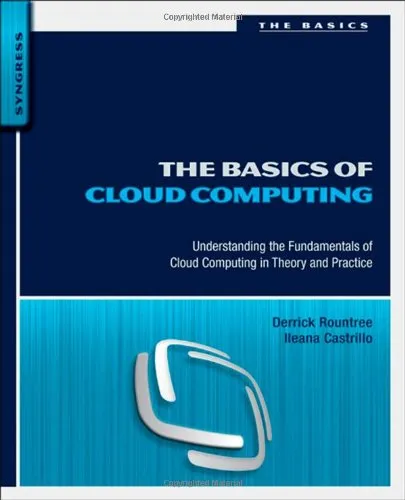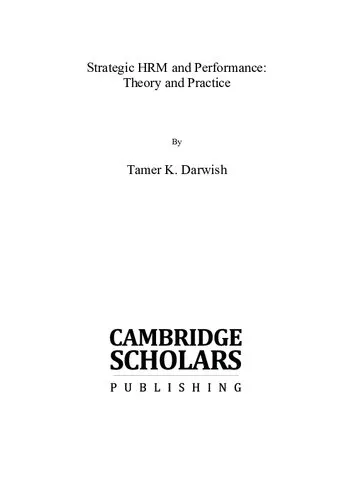Accounting for Profit for Breach of Contract. Theory and Practice
4.5
Reviews from our users

You Can Ask your questions from this book's AI after Login
Each download or ask from book AI costs 2 points. To earn more free points, please visit the Points Guide Page and complete some valuable actions.کتاب های مرتبط:
Introduction
"Accounting for Profit for Breach of Contract: Theory and Practice" is an academic work that examines the concept of accounting for profits in cases of contract breaches from both theoretical and practical perspectives. Written by Katy Barnett, this book bridges the gap between theory and real-world application, providing an invaluable resource for legal scholars, practitioners, and students. It offers a thorough analysis of how accounting for profits can operate as a remedy for breach of contract and explores its broader implications in both common law and equity.
This book delves deep into the principles behind profit restitution claims, the circumstances in which they arise, and how courts approach the calculation of profits. It provides insights into the rationale of allowing an aggrieved party to recover profits made by the breaching party, contrasting this remedy with other traditional compensatory measures. Each chapter of this book is thoughtfully curated, combining rigorous legal study with practical examples to enhance comprehension and applicability in today's legal environment.
"Accounting for Profit for Breach of Contract" stands out because it not only examines the theoretical principles underpinning the accounting for profit remedy but also brings them to life through detailed practical illustrations and discussion of recent case law. The book addresses key debates, such as whether such remedies foster fairness or create unjust enrichment, and provides a balanced perspective supported by legal doctrines and judicial authorities.
Detailed Summary of the Book
Divided into several meticulously crafted sections, the book begins with a robust introduction to the basics of breach of contract, compensatory remedies, and the principles of restitution. Subsequent chapters shift the focus to the unique remedy of accounting for profits, its legal roots, and its role in achieving justice between parties.
The discussion progresses to examine specific cases where accounting for profits has been awarded. By analyzing historic and modern precedents, the book provides a multi-jurisdictional perspective, helping readers better understand variations in judicial approach. Each case study includes detailed breakdowns of court reasoning, profit calculations, and the underlying principles applied. This is complemented by theoretical discussions on whether accounting for profit constitutes a fair remedy or if it strays from the compensatory aim of contract law.
Barnett also delves into the coexistence between equitable and legal remedies, exploring how and when courts may lean toward granting an account of profits over damages. This includes a focus on scenarios where a breaching party acts in bad faith or reaps an undue financial benefit due to the breach that exceeds traditional compensatory measures.
The final chapters tie everything together, examining potential reforms and the future of profit-based remedies. Barnett discusses whether broadening these remedies could enhance justice or lead to more uncertainties in contract law.
Key Takeaways
- Introduction to accounting for profits as an alternative remedy for breach of contract.
- Detailed analysis of key case law and its practical applications.
- Exploration of the intersection between restitution, unjust enrichment, and contract law.
- Insight into the ethical and policy considerations surrounding profit restitution.
- Critical examination of possible expansions or limitations of the remedy.
Famous Quotes from the Book
"A breach of contract is not just a failure of obligation – it is a disruption of the bargain between two parties. Where one side profits disproportionately, equity demands a remedy beyond mere compensation."
"The aim of accounting for profits is not to punish the wrongdoer, but rather to ensure that neither party benefits unduly from what is otherwise a breach of a consensual obligation."
"Restitution for wrongful gains is a remedy that resonates deeply with the instinct for fairness, ensuring that justice considers both the loss to the aggrieved and the gains of the offender."
Why This Book Matters
"Accounting for Profit for Breach of Contract" is a critical contribution to contemporary legal literature. Breach of contract is an issue that arises daily in the commercial world, yet the remedies available for such breaches remain a complex and often contentious area of law. Barnett shines light on the under-explored remedy of accounting for profits, filling a crucial gap in the understanding of how this remedy can be effectively utilized to ensure justice and deterrence.
The book appeals to both scholars and practitioners, offering a nuanced perspective that is both academically rigorous and practically actionable. Additionally, the exploration of this remedy within the context of broader restitutionary principles opens the door to rethinking how legal systems approach breach of contract cases in the future. By advocating for fairness and balance in contract law, this work pushes readers to question traditional compensatory approaches and consider the broader implications of profit restitution.
In an age of growing complexity in contractual relationships, this book provides a roadmap for navigating disputes effectively while promoting equitable outcomes. Whether you are a lawyer, academic, judge, or student, "Accounting for Profit for Breach of Contract" will leave you with a deeper understanding of this fascinating area of law.
Free Direct Download
You Can Download this book after Login
Accessing books through legal platforms and public libraries not only supports the rights of authors and publishers but also contributes to the sustainability of reading culture. Before downloading, please take a moment to consider these options.
Find this book on other platforms:
WorldCat helps you find books in libraries worldwide.
See ratings, reviews, and discussions on Goodreads.
Find and buy rare or used books on AbeBooks.
1308
بازدید4.5
امتیاز0
نظر98%
رضایتReviews:
4.5
Based on 0 users review
Questions & Answers
Ask questions about this book or help others by answering
No questions yet. Be the first to ask!













